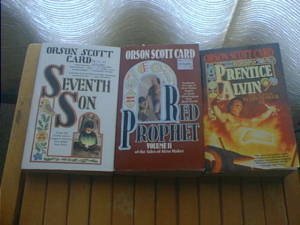Sunday 13 February 2005

|
Pic of the day: The books (paperback). Alvin Maker I-IIIYeah, I know in my first review I gave the impression that I would only be reading these books on the bus. I lied. Let me tell you one thing, if you read to fall asleep, these are not the books you want. Anyway, at the time of writing I have read these three and then some. And there's something interesting I have to point out first. To me, it looks like the three books are written by three different authors, or the same author writing at different times of his career, years apart. The last possibility is probably correct, or perhaps this is intentional. And the strangest thing is, it looks to me as if the third book must be written first. Or at least part of it. According to Orson Scott Card, he actually wrote a poem which years later gave rise to the book, and this poem predated the whole series. Perhaps that is it. But there is something about them, a difference in style and flavor. The first book is about Alvin's childhood, so perhaps it is natural that it has a more "children's book" feel. Oh, it is clearly not a children's book. There is too much sorrow and death for a modern children's book. But still, there is some innocence, a childlike sense of wonder, a subjectivity that does not continue into the next books. ***Book two ("Red Prophet") is more a young adult book, full of drama and adventure, but in language it is as grown-up as you could wish for. People talk the way real people talk, with no censorship. It is a well polished tale, even elegant, the way all things fit together. Filler is scarce, even small details are there for a reason. If all the world's books were so tightly edited, there would be more reading in the world. "Red Prophet" goes all out in portraying the Red Indians as sacred caretakers of the land. They have a kind of nature magic, stronger in some but present in them all unless they drink whiskey or otherwise do White things. The forest opens for them when they move through it, the dead twigs soften so as to not make a sound when they step on it, and magical energy from the ground seeps into them so they can run faster than the fastest horse. When they need food, the animals come to stand before them to be killed, and the Reds only kill what they need for food. It is almost the Garden of Eden, until the White man comes and kills the land. Yeah, right. I know OSC doesn't really believe that, but he says that the books are based on real folk belief and myths from the frontier, and I don't think people thought that highly of the Reds at any time. And barely even now. I'm not even sure the Native Americans think that highly of their ancestors. ***Book three ("Alvin Prentice") is odd. In a way it seems raw, as if it came to the author as a revelation rather than his own carefully crafted handiwork. Oh, not all of it, but parts. It is also a disturbing book, because it spans the years where Alvin changes from being a human to becoming something more, a new and different Messiah. The book opens with a major spoiler, that by the end of his apprenticeship Alvin will have committed what the law calls murder. But near the end of the book, where it happens, it is not really a big event. It is just a detail, spanning a few lines. For the changes that have happened in Alvin by then completely overshadow any event outside him. The book never really makes his first (and possibly only) murder a big deal. You'd think for someone who once wept for the death of insects, it would be a defining event in his life. But rather it reminded me of the scene near the end of C. S. Lewis' "Out of the Silent Planet", where the archangel of Mars casually disintegrates the greedy businessman because "the [sentient life] in him was already dead". It was disturbing then and it is disturbing now, probably because it is too close to my own way of thinking. The raw, revelation-like part shows Alvin as a Messianic archetype. He is also well aware of this, obliquely comparing himself to Jesus, seeing the Making of water into wine as an example of what he is meant to do. Oh, not exactly that, but symbolically – transforming things at its most basic level. Near the end of "Alvin Prentice" we also have a baptism, in which Alvin transforms a person into a new, improved version of that person, more like Alvin, while submerging him in a river. It all makes sense at the time, but subtle it is not. After reading all the three books, I am no longer so sure of Cards's anti-Christian attitude. Perhaps he is just against the modern business-like Christianity, and why shouldn't he? But more about Alvin and Jesus later ... God willing. |
Yesterday <-- This month --> Tomorrow?